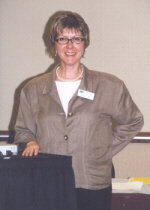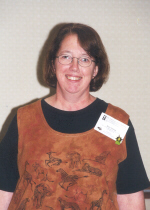Helping Libraries Help
People
Presentation to the Health Sciences OCLC Users
Group Meeting
Alane Wilson (OCLC), Betsy Friesen, Facilitator
New Orleans, La. - October 28, 2001
A pathfinder in support of this program is available
in the OCLC Connexion Pathfinder Database:
Dynamic Pathfinder PURL: http://purl.oclc.org/corc/system/Pathfinder/2735:xid=LTM
 Alane
presented a comparison of the Catalog Today (WorldCat) and what is envisioned
for the Catalog in the Future. Alane
presented a comparison of the Catalog Today (WorldCat) and what is envisioned
for the Catalog in the Future.
[Editor's note: Her remarks are set in the framework of goals expressed
in two paragraphs of "Extending the Cooperative" which are quoted below.]
"WorldCat Libraries and
OCLC will transform WorldCat from a bibliographic database and online
union catalog to a globally networked information resource of text,
graphics, sound and motion. This enhanced version of WorldCat will
include a shared knowledge base supported by a set of integrated,
web-based tools and services that facilitate contribution, discovery,
exchange, delivery and preservation of knowledge objects and shared
expertise of participating institutions. Cataloging and metadata OCLC
will extend its cooperative cataloging framework to include new participants,
new uses of metadata and new automated tools to capture, organize
and deliver metadata. In addition to libraries, OCLC will seek the
input of metadata from museums, archives, professional societies,
publishers and others, including authors. Each of these providers
will use and share metadata that includes descriptions, holdings,
reviews and previews as well as links to content. New services will
support the MARC format as well as other metadata formats, such as
Dublin Core. "
The current WorldCat is defined in part by the following description:
30th Anniversary
49 million bibliographic records
~ 800 million location listings
In 434 languages
Represented in MARC 8 character set EBCIDIC encoded
Located in Dublin, Ohio
Unicode used only for display purposes
Records Currently
- Single Master Record online
- Roman alphabet (CJK & Arabic)
- Must be MARC or MARC-like
The Catalog in
the Future is being developed now
to include more than just bibliographic data: Text - Graphics - Sound
- Motion
Extending WorldCat will be supported by Oracle, a commercial database
engine,
Unicode enabled from the start
Available 24 X 7
Linking to international repositories such as archives, museums, EU
Cat, PICA (a Netherlands utility)
Recent WorldCat enhancements include:
- Added evaluative content
- Cover art, tocs, and summaries for books
- Interface redesign
- Doctype icons, checkboxes & tab limiters
- Z39.50
- OPAC holdings link
- Display local data in WorldCat and other FS dbases
- Links to Web booksellers Alibris, ABAA, ABE, with more on the
way
- Rank results by library count
- Most widely held titles displayed first (Will become default ranking
soon)
The Changing Record... OCLC is looking at Globalization, one of our
biggest challenges:
- Unicode as the native data representation to facilitate sorting,
indexing, use of stop words, multi-lingual thesauri support
- Global networking and linking technologies
- Explicit support for non USMarc formats and data types
New international based data model:
IFLA Functional Requirements for Bibliographic Records (FRBR)
from the IFLA Study Group on the Functional Requirements for Bibliographic
Records, (1998)
Why FRBR?
To answer the questions: What information is of the most value to
users of the catalog and how can this information be used more effectively?
The 4 level FRBR
model begins with the WORK (e.g., Shakespeare's Hamlet), then
the WORK is realized for example through individual translations
which become the EXPRESSION. Then the EXPRESSION is
embodied in published editions, which constitute the MANIFESTATION.
Finally the MANIFESTATIONS are exemplified by descriptions
of ITEMs available in libraries.
What have we been working on?
Database platform selection (Oracle):
- extensive testing (performance, functional and operational) and
classes and modeling exercises.
- Begun Data modeling
- Started an infrastructure Architecture group
- Begun transition planning
How will OCLC make the transition from the current catalog
to the future catalog?
Transform the database itself;
- Run parallel systems for a while
- Goal is to be done in 3 years
- Actual sequence of moving applications to new platform currently
under discussion.
Cataloging & Metadata Services:
OCLC's new Cataloging and Metadata program will transform OCLC's traditional
cataloging service to a comprehensive metadata creation and management
service to help librarians, library users and information partners effectively
manage their ever-expanding collections of physical and electronic resources.
Metadata Capture Services:
New tools to help authors create metadata for their work, and for
patrons to create reviews.
New methods to obtain metadata earlier in the publication cycle:
-Work with publishers and distributors:
-continue/expand CIP upgrade program,
-improve the coverage of video and music titles,
-build electronic record sets for e-books and journals.
-Capture bibliographic data from materials vendors
-Registry services (ISBN, ISTC, ISAN, etc.)
-New and improved batch loading of records and holdings
Metadata Linking services:
-Provide more detailed description of items through access to evaluative
information in order to support discovery and fulfillment services
-Linking versus loading:
- cheaper than loading data;
- more timely than loaded data;
- easier to bundle data & content delivery,
- some owners more comfortable with linking than with loading
- Rights Management
Consulting and Contract Services:
Work with regional networks and distributors to help libraries evaluate
and select solutions that fit their workflow needs and lower their overall
costs for technical processing.
Help libraries deal with reduced staffing and special skill set requirements
by providing outsourcing options for:
-current cataloging of special formats and languages;
-collection assessment; retrospective conversion;
-special collections (Language Sets)
Online Cataloging Services:
Help libraries simplify their usage of OCLC by integrating existing
services and products into a single entry-point, browser-accessible,
web-based service
Help libraries catalog more types of information objects by supporting
more metadata standards (ONIX, EAD, etc.)
Help libraries catalog more foreign language materials by providing
support for additional scripts (Hebrew, Cyrillic, etc.)
Maintain/improve productivity levels through improved tools
Target schedule for online services:
-Phased transition from now through July 2003
-Phase-out stand alone cataloging products Integrate services to form
a cataloging and metadata services desktop; part of library services
desktop
-Offer levels of functionality to match different library/cataloger
needs
MeSH in CORC Survey, 2001 was summarized:  74% of responding libraries provide access to e-resources via web
lists
65% provide access to e-resources via catalogs Most provide multiple
ways to access these resources
83.9% of HS sites in "Government Information on the Internet, 2000"
are in CORC
100% of HealthWeb sites are in CORC
74% of responding libraries provide access to e-resources via web
lists
65% provide access to e-resources via catalogs Most provide multiple
ways to access these resources
83.9% of HS sites in "Government Information on the Internet, 2000"
are in CORC
100% of HealthWeb sites are in CORC
Retrieval of pathfinders available through CORC were demonstrated.
****************************************************************
Image of Betsy Friesen, Facilitator
|
 Alane
presented a comparison of the Catalog Today (WorldCat) and what is envisioned
for the Catalog in the Future.
Alane
presented a comparison of the Catalog Today (WorldCat) and what is envisioned
for the Catalog in the Future.
